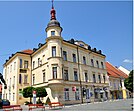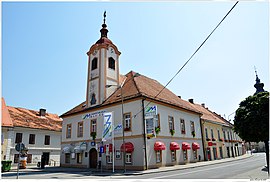| Slovenska Bistrica | |
|---|---|
| Town | |
      From top, left to right: Bridge over Bistrica river into town, Bistrica Castle, St. Joseph's Church, Convent of School Sisters of St. Francis, Former Hotel, Town center houses From top, left to right: Bridge over Bistrica river into town, Bistrica Castle, St. Joseph's Church, Convent of School Sisters of St. Francis, Former Hotel, Town center houses | |
 Flag Flag Coat of arms Coat of arms | |
 | |
| Coordinates: 46°23′25″N 15°34′30″E / 46.39028°N 15.57500°E / 46.39028; 15.57500 | |
| Country | |
| Traditional region | Styria |
| Statistical region | Drava |
| Municipality | Slovenska Bistrica |
| Area | |
| • Total | 7.97 km (3.08 sq mi) |
| Elevation | 274.9 m (901.9 ft) |
| Population | |
| • Total | 8,118 |
| Vehicle registration | MB |
Slovenska Bistrica (pronounced [slɔˈʋeːnska ˈbiːstɾitsa] ; German: Windisch-Feistritz) is a town south of Maribor in eastern Slovenia. It is the seat of the Municipality of Slovenska Bistrica, one of the largest municipalities in Slovenia. The area is part of the traditional region of Styria. The town is included in the Drava Statistical Region.
History
The town was established in the 13th century on the trade road between Maribor and Celje, and was granted market rights in 1313. It was originally called just "Bistrica", a common toponym for rapid-flowing streams and rivers in South Slavic languages; the present name of Slovenska Bistrica (German: Windisch-Feistritz) first appears in records dating from 1565.
Before 1918, the town had a German-speaking majority (in the last Austrian census of 1910, 57.7% of the inhabitants declared German as their language of daily communication), while the surrounding countryside was almost exclusively Slovene-speaking.
Demographics
The town has a population of 8,016 (in 2018). Many locals commute to Maribor for work, less than an hour's drive away.
Landmarks
The town offers several interesting sights, including Bistrica Castle, churches, a Roman road, and the Ancient Roman fort of Ančnik. It serves as a starting point for hiking excursions to nearby Mount Boč.
Parish church
The parish church in the settlement is dedicated to Saint Bartholomew (Slovene: sveti Jernej) and belongs to the Roman Catholic Archdiocese of Maribor. It is first mentioned in written documents dating to 1240, but was greatly rebuilt and extended in the Baroque style in the 18th century. The belfry dates to the 19th century. Two other larger churches in the town are dedicated to Our Lady of the Seven Sorrows and Saint Joseph. They date to the 15th and 18th centuries.
| Year | Pop. | ±% |
|---|---|---|
| 1948 | 2,261 | — |
| 1953 | 2,570 | +13.7% |
| 1961 | 2,694 | +4.8% |
| 1971 | 2,974 | +10.4% |
| 1981 | 6,320 | +112.5% |
| 1991 | 6,711 | +6.2% |
| 2002 | 6,591 | −1.8% |
| 2011 | 7,454 | +13.1% |
| 2021 | 8,252 | +10.7% |
| Population size may be affected by changes in administrative divisions. | ||
Notable people
Notable people that were born or lived in Slovenska Bistrica include the following:
- Herta Haas (1914–2010), one of the wives of Josip Broz Tito
- Urska Zigart (born 1996), professional cyclist.
- Kaja Korošec (born 2001), international footballer
References
- ^ "Naselje Slovenska Bistrica". Statistični urad Republike Slovenije. Retrieved April 24, 2020.
- "Uradna spletna stran Občine Slovenska Bistrica". Slovenska-bistrica.si. 2013-12-04. Retrieved 2013-12-09.
- ^ Archived July 12, 2010, at the Wayback Machine
External links
- [REDACTED] Media related to Slovenska Bistrica at Wikimedia Commons
- Slovenska Bistrica on Geopedia
